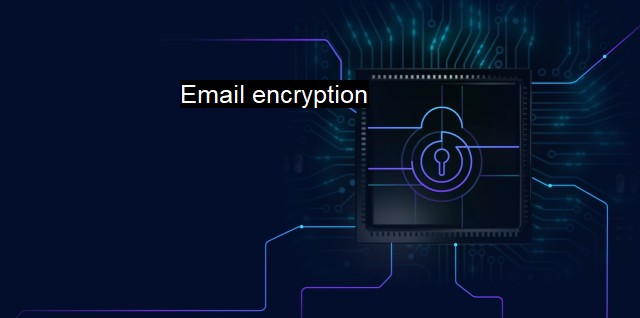What is Email encryption?
Why Email Encryption is Vital for Cybersecurity: Safeguarding Sensitive Information from Hacks and Breaches
Email encryption is a critical topic in cybersecurity and antivirus policy. In its basic form, email encryption involves the conversion of email messages into a format that cannot be easily read as plain text, offering a layer of security that ensures only the intended recipient can interpret them. This method of communication helps maintain privacy and secure sensitive information from potential attackers, just as antivirus applications protect computer systems from malicious software.To comprehend the benefits of email encryption with let's delve into what email encryption is and its associated mechanisms. Simply put, email encryption translates plain text into cipher text - a scrambling of data into a form that only parties with the correct decryption key can understand. It offers end-to-end security, meaning the email's content is protected from the minute it is sent until it reaches its destination.
Email encryption typically happens through two methods: Symmetric-key encryption and public-key encryption. In symmetric-key encryption, the same key is used by both parties in the encryption and decryption process. Thus, the challenge lies in the exchange of the encryption key between sender and receiver safely. In contrast, public-key encryption (often called asymmetric encryption) employs a pair of keys for each individual – one to encrypt the data (public key) and another to decrypt it (private key). The complexity of these encryption algorithms ensures that only the recipient possessing the corresponding private key can decrypt and access the encoded information.
In the grand scheme of cybersecurity, this is akin to having protective software measures similar to antivirus defenses, but even more focused. Antivirus programs guard your systems against malware and other harmful threats that can potentially damage your data and device. Just as an antivirus focuses on the device's systemic protection, email encryption targets the protected transmission of data messages - in this case, emails.
Email encryption is extremely vital in cybersecurity for copious reasons. In the modern world, massive amounts of confidential data are transmitted daily via emails. This data may involve sensitive information ranging from legal documents, intellectual property, financial information, to personal communications. Unwanted breaches in email communication can lead to devastating implications such as identity theft, financial loss, or corporate sabotage.
Encryption also helps in compliance with regulations. In various sectors, especially in healthcare, finance and law, there are stringent guidelines and legal provisions relating to the handling of sensitive and private data. Using email encryption, these organizations can ensure they are adequately protecting data and maintaining compliance with such regulations.
The role of cybersecurity isn't restricted merely to self-defense. In the cyberspace landscape, individuals and organizations are also ethically and legally bound to protect the data they process, and this includes data transmission via email. Email encryption serves this very purpose by fortifying the cyberspace against efforts to infiltrate and seize sensitive data.
While antivirus programs provide a robust initial line of defense for computers and networks against external attacks and intrusions, they are insufficient alone to protect against theft or interception during transmission of emails. This is where email encryption comes in as an added supplementary line of safeguard and is growing to become a fundamental cornerstone in cybersecurity. Much like having an antivirus, encryption tools as a whole are critical components of a robust cybersecurity strategy.
In sum, email encryption is akin to protecting physical mail with a padlocked case as it passes through various hands until it reaches its recipient. In our increasingly interconnected world, with digital data serving as a valuable asset, the encryption of email and other data has become more than a luxury but rather a necessity. Thus, alongside antivirus, email encryption stays paramount in shaping a future secure in cyberspace.
Therefore, it is integral to understand that in today's era of rampant cyber threats, mere antivirus protection, while critical, does not paint the entire picture of cybersecurity. Measures such as email encryption contribute an extra yet crucial layer of security, reaffirming why their implementation should be a key part of every comprehensive cybersecurity strategy.

Email encryption FAQs
What is email encryption?
Email encryption is the process of encoding messages so that only authorized parties can read them. It is a cybersecurity measure that is used to protect sensitive information in transit over the internet.Why is email encryption important for cybersecurity?
Email encryption is important for cybersecurity as it helps to prevent unauthorized access to sensitive information. It ensures that only the intended recipient can read the message, and it protects against interception and eavesdropping by cybercriminals.How does email encryption work?
Email encryption works by using a combination of public and private keys to encode and decode messages. The sender uses the recipient's public key to encrypt the message, and the recipient uses their private key to decrypt it. This process ensures that only the intended recipient can read the message.What are the benefits of using email encryption?
The benefits of using email encryption include protecting sensitive information, maintaining privacy, and complying with industry regulations. It also helps to build trust with customers and partners, as it demonstrates a commitment to data security and protection.| | A | | | B | | | C | | | D | | | E | | | F | | | G | | | H | | | I | | | J | | | K | | | L | | | M | |
| | N | | | O | | | P | | | Q | | | R | | | S | | | T | | | U | | | V | | | W | | | X | | | Y | | | Z | |
| | 1 | | | 2 | | | 3 | | | 4 | | | 7 | | | 8 | | |||||||